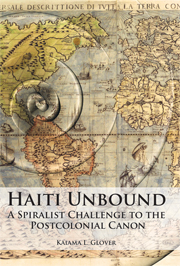Book contents
- Frontmatter
- Contents
- Acknowledgements
- Preface
- Part I Introduction: The Consequences of Ex-Centricity
- Part II Shifty/Shifting Characters
- Part III Space-Time of the Spiral
- Part IV Showing vs. Telling
- 7 The Stylistics of Possession
- 8 Framing the Folk
- 9 Schizophonic Solutions
- Part V Conclusions: No Lack of Language
- Works Cited
- Index
7 - The Stylistics of Possession
from Part IV - Showing vs. Telling
- Frontmatter
- Contents
- Acknowledgements
- Preface
- Part I Introduction: The Consequences of Ex-Centricity
- Part II Shifty/Shifting Characters
- Part III Space-Time of the Spiral
- Part IV Showing vs. Telling
- 7 The Stylistics of Possession
- 8 Framing the Folk
- 9 Schizophonic Solutions
- Part V Conclusions: No Lack of Language
- Works Cited
- Index
Summary
Frankétienne
From the very beginning … the cry imposed its very particular syntax on the slave. For the Antillean, the word is, first and foremost, sound. Noise is speech. Clamor is discourse. This must be understood.
—Edouard GlissantOf the three Spiralists, Frankétienne has been perhaps the most overt in his attention to the specifically formal challenges to writing in and from a geographical space where the distance between the written and the real is so remarkable. Author of the world's first full-length novel in Haitian Creole, resolute refuser of exile, math teacher, and community leader, Frankétienne's actions reveal a commitment to the insular collective that inspires his literary production. At the same time, however, the sesquipedalian acrobatics of his prose fiction certainly appear, at first (and second and third) glance, to be at odds with any sort of populist intent. Frankétienne is aware of this apparent contradiction. In fact, he ultimately goes so far as to name it: “schizophonia,” officially introducing the term in the title of his 1993 spiral, L'Oiseau schizophone. Though this title appears some years after the publication of the three works discussed here, there is no question that the concepts it describes are present from Frankétienne's first writings. Yves Chemla defines schizophonia as
the attitude or position of the artist … who realizes little by little that the sounds s/he hears and that s/he produces are the only ones capable of evoking the chaos and the pollution that affect the world (as well as language itself) by means of neologism, lexical invention, rhymes and echoes, alliterations and encounters between sounds and images.
(Chemla, “Iconographie”)- Type
- Chapter
- Information
- Haiti UnboundA Spiralist Challenge to the Postcolonial Canon, pp. 183 - 207Publisher: Liverpool University PressPrint publication year: 2010

